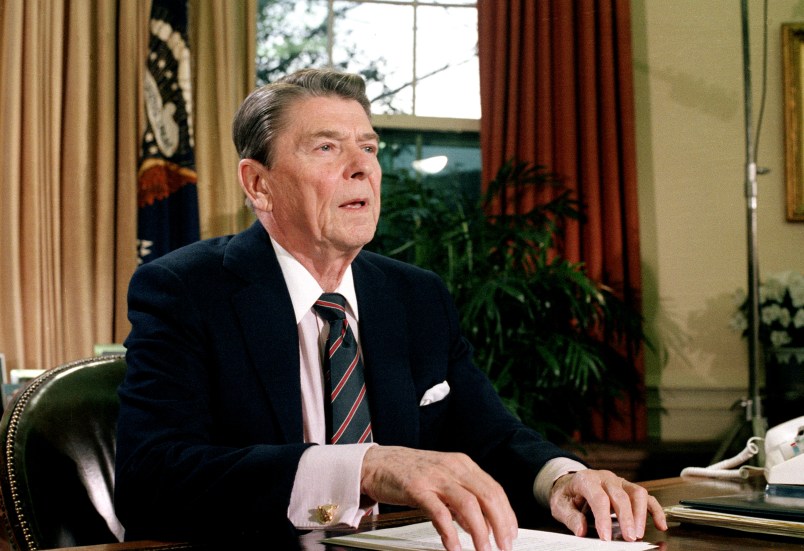Twenty-five years after the Ronald Reagan era ended, Democrats are anxious to move past his conservative vision that is premised on the evils of government. The mentality has continued to permeate the national debate even as Republicans have lost four out of the last six presidential elections, aided by a Democratic Party that has admittedly ceded it too much ideological ground.
No more, they say. The American economy remains in a slump, middle class incomes have stagnated, social mobility is in decline and income inequality has soared to unprecedented heights. Democrats’ prescriptions to heal these wounds were again thwarted by Republicans in Congress last year despite their defeat in the 2012 election. If Democrats can’t make a compelling case for government to play a larger role in solving these problems now, then when?
It’ll be a crucial subtext of President Barack Obama’s sixth State of the Union speech Tuesday night. A desire to fight back against the Reagan-era mentality, which is alive and thriving in the modern tea party movement, was also the subject of a lengthy speech last week by Sen. Chuck Schumer of New York, the third-ranked Democrat.
“Since the progressive and populist eras, Democrats have believed that without a strong, smart, and forceful government, the people suffer. With government, society can advance,” said Schumer, a top Obama ally. “Republicans generally believe the opposite. But since the days of Ronald Reagan, we have been quiet, defensive and even ashamed of our view.”
Broadly, Democrats want to aggressively make the case for government as a force for good after decades of accommodating the conservative premise — if not outright embracing it, as Bill Clinton did in 1996 when he famously declared that “the era of big government is over.” Eighteen years later, the ghost of Reagan continues to haunt Democrats, even as it stymies their goals, and party leaders are increasingly eager to exorcise those demons.
Specifically, that means ditching the conservative-driven focus on deficits and the size of government — which was embraced by a dejected Obama after the 2010 midterm elections — and instead sell a vision aimed at achieving a fairer and more equal society. Pocketbook middle-class issues like the minimum wage and unemployment compensation fall into this category. Investments in education, manufacturing, infrastructure, research and creating a more progressive tax code are also key Democratic goals that are going nowhere in Congress.
“We didn’t want to shrink government as much and as broadly as Republicans did, but we certainly agreed it should shrink,” Schumer said. “But the times are now ripe for a renewed and robust defense of government. For the near future, the deficit has been, in good part, tamed.”
White House senior adviser Dan Pfeiffer promises an “optimistic speech” in which Obama will “lay out a set of real, concrete, practical proposals to grow the economy, strengthen the middle class, and empower all who hope to join it.” The president’s recent rhetoric and initiatives point to an clear theme: If repeated electoral defeats won’t “break the fever” among conservatives, as the president refers to it, then it’s up to Democrats to build the sort of nationwide coalition that’ll force them to shift. Pfeiffer calls it “the project to restore opportunity for all.”
Last week, at a U.S. Conference of Mayors reception, Obama said that “while our economy is growing stronger, and we are optimistic about growth this year and in subsequent years, we’ve got a lot more work to do to make sure that everybody has a chance to get ahead. If they’re willing to work hard and take responsibility, they’ve got to be able to participate in that growth.”
In the near term, of course, the tea party’s iron grip on the House of Representatives means Obama will in many cases have to end-run Congress and rely his executive power to get things done. “In this year of action, the President will seek out as many opportunities as possible to work with Congress in a bipartisan way,” Pfeiffer said. “But when American jobs and livelihoods depend on getting something done, he will not wait for Congress.”










